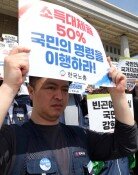Expert Discusses Korea-U.S. Alliance
Dong-A Ilbo had an interview with three centrist Korea experts in Washington last week. Below is an interview with Robert J. Einhorn, a senior advisor of the Center for Strategic and International Studies (CSIS).
The Korean government argues that Korea-U.S. alliance is strong. What do they think in Washington?
Related officials from the two countries are doing their best to come up with the best results from the current situation. Anyone who has observed the relations between the two countries for a few years would admit that there is a serious problem in the relationship. Relations are not based on trust, and it has been that way for many years. The response of President Roh and high-level officials of the Korean government to the Norths test fire of missiles was a shock to Washington. Roh seemed more interested in criticizing Japan than North Korea. Relations between the two countries are not likely to be improved under the current administrations.
Isnt the U.S. also to be blamed for worsened relations?
Some American officials responded emotionally to developments from Korea over the last few years. This was not an official response of the administration of course. At the government level, we tried to avoid anything that would jeopardize the alliance. However, some did respond emotionally to the importance of the alliance being undervalued by South Korea.
Recently, Korean high-level officials pointed out the failure of American policies in relation with Norths missile tests. What do you think about this?
The South Korean minister made a mistake in saying that the U.S. failed in the missile issue. Clearly, it is the North who has failed. However, President Roh aggravated the situation. It would have been better if he distanced himself from or ignored the ministers statement. Rather, he reinforced the ministers foolish statement. This was not dealt as an official issue in Washington, but it could not believe how an ally can respond as such. Of course, there are differences of opinions and interests between allies. However, these differences should be resolved at unofficial negotiating table, not headlines.
Do you think that such statements could affect the root of the alliance?
We have witnessed many behaviors that hurt the alliance. This statement is no exception. But the Bush administration is also to be blamed. It should have had more negotiations with allies on issues such as realignment of U.S. forces. South Korean governments approach to the North confused Washington. Too often, President Roh and his aides seemed to be speaking for North Korea, and justified Norths many behaviors. This made even the staunch supporters of the alliance have doubts.
How do you assess South Korean governments policy direction on Norths nuclear and missile issue?
The important thing is what signal the South Korean government sends to the North. Currently, the South is sending signals that it is not ready to pressure the North and that it would put up with yet another provocation of the North. Washington recognizes the importance of inter-Korean dialogue, and we are not saying that the dialogue should come to an end. However, the South should have been more selective in its approach to the North after adoption of UN Security Council resolution. It should be careful in cooperation with the North, in particular sending large amount of cash. It should not make North Korea have expectations that South Korea and China will continue to support the North no matter what it does. Unless the North realizes that it would be even more isolated and that South and China would impose more regulations should it continue its current path, it would not stop.
Do you think tensions on the peninsula will intensify if South Korea pressures the North?
The North would respond rather roughly at first to threaten the South and to make it worry that inter-Korean relations would fall apart permanently. However, if the North realizes that the South has run out of patience, it would know that it needs to restrain its behavior. We need to make North Korea consider the benefits it would gain if it changes its stance.
There are perceptions in South Korea that U.S. forces in Korea are critical to the interest of the U.S. And that the U.S. is saying that it would withdraw U.S. forces to gain more information. What do you think about this?
The U.S. will station its forces in Korea only when its government and its people agree. We will withdraw if that is what the Koreans want. The U.S. does not have an integral need to station its forces in Korea independent of what Koreans want. The U.S. has various methods to achieve its strategic goals in East Asia. Two countries shared mutual benefit by stationing U.S. forces in Korea for many years. If Korea thinks that there in no more mutual benefit, we will withdraw our forces.
Robert J. Einhorn graduated Cornell University in 1969. He has a masters degree from the Woodrow Wilson School of Public and International Affairs, Princeton University. He was a senior advisor at the State Departments Political-Military Bureau, and was a deputy assistant secretary for nonproliferation in the State Department`s Political-Military Bureau. He visited the North in 2000 and had two meetings with North Korean leader Kim Jong Il. He is now a senior advisor at CSIS.





